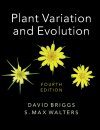By: David Briggs(Author), Stuart Max Walters(Author)
578 pages, 108 b/w illustrations, 36 tables
![Plant Variation and Evolution Plant Variation and Evolution]()
Click to have a closer look
About this book
Contents
Customer reviews
Biography
Related titles
Recommended titles
About this book
We are in the midst of a biological revolution. Molecular tools are now providing new means of critically testing hypotheses and models of microevolution in populations of wild, cultivated, weedy and feral plants. They are also offering the opportunity for significant progress in the investigation of long-term evolution of flowering plants, as part of molecular phylogenetic studies of the Tree of Life. This long-awaited fourth edition of Plant Variation and Evolution, fully revised by David Briggs, reflects new insights provided by molecular investigations and advances in computer science. Briggs considers the implications of these for our understanding of the evolution of flowering plants, as well as the potential for future advances. Numerous new sections on important topics such as the evolutionary impact of human activities, taxonomic challenges, hybridisation and speciation, and the molecular genetic basis of breeding systems will ensure that this remains a classic text for both undergraduate and graduate students in the field.
Contents
Preface
Acknowledgements
Note on names of plants
List of abbreviations
1. Investigating plant variation and evolution
2. From Ray to Darwin
3. Early work on biometry
4. Early work on the basis of individual variation
5. Post-Darwinian ideas about evolution
6. DNA: towards an understanding of heredity and molecular evolution
7. Breeding systems
8. Infraspecific variation and the ecotype concept
9. Pattern and process in plant populations
10. Pattern and process: factors interacting with natural selection
11. Populations: origins and extinctions
12. Species and speciation: concepts and models
13. Allopatric speciation and hybridisation
14. Abrupt speciation by polyploidy
15. The species concept
16. Flowering plant evolution: advances, challenges and prospects
17. Historical biogeography
18. The evolutionary impact of human activities
19. The taxonomic challenge ahead
20. Conservation: from protection to restoration and beyond
Index
Customer Reviews
Biography
David Briggs is Emeritus Fellow of Wolfson College at the University of Cambridge. He has a lifelong interest in evolution, genetics, conservation and taxonomy. He is also the author of Plant Microevolution and Conservation in Human-influenced Ecosystems (Cambridge, 2009), which won the British Ecological Society's 2011 Marsh Book of the Year award.
Stuart Max Walters (1920–2005) – a former Fellow of King's College, Cambridge – was a renowned taxonomist and conservationist and author/editor of major works on the taxonomy and distribution of European plants, including Atlas of the British Flora, Flora Europaea and The European Garden Flora. He was Director of the University of Cambridge Botanic Garden from 1973 until his retirement in 1983.









































